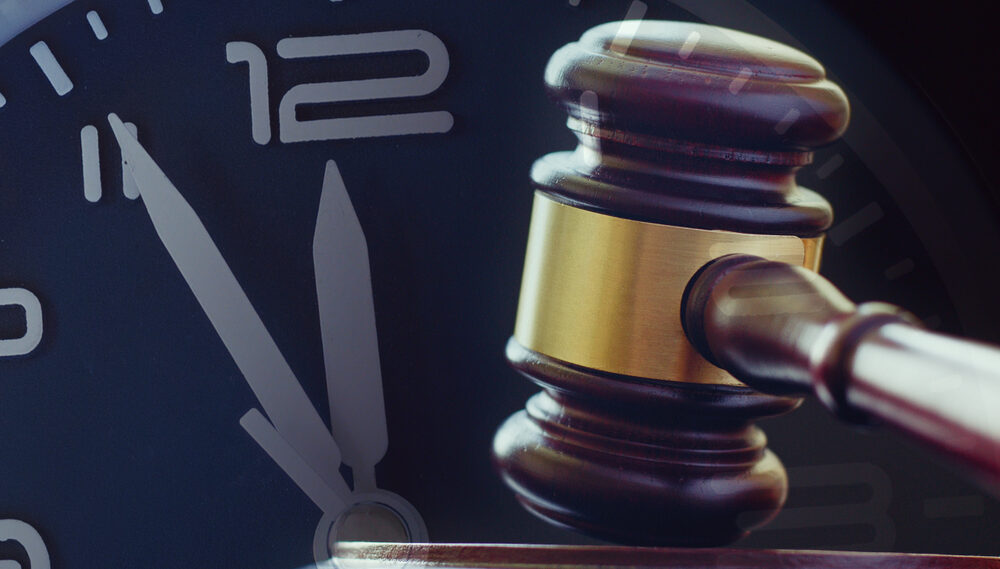
Did a truck accident injure you? If so, you may have the right to file a legal claim to recover compensation for losses you have suffered, including medical expenses, rehabilitation costs, long-term care expenses, loss of income, lost future earning capacity, and pain and suffering.
Although you might prefer to focus on your physical and emotional recovery before starting a legal case, you only have a limited time to file claims against those responsible for the truck accident.
You need to know how long you have to file a claim for a truck accident if you wish to pursue financial relief and justice from those at fault for your injuries and losses. A truck accident attorney can advise you on when to file legal claims to preserve your rights in your truck accident case.
Your truck accident lawyer can also guide you through each stage of the truck accident claims process and help you avoid mistakes that may jeopardize the compensation you need for your injuries and losses.
The Statute of Limitations for Truck Accident Lawsuits
Every state has its own statute of limitations which imposes a deadline for filing a lawsuit after a truck accident. The statute of limitations ensures the timely filing of claims in court to avoid the problem of lost or destroyed evidence. It also provides certainty for parties to know they will not face old claims that arose years ago.
California law, for example, gives accident victims two years from the date of an accident to file a personal injury claim. The statute of limitations on property damage claims requires filing a lawsuit within three years of the truck accident.
The statute of limitations might not apply, or the courts could pause, or toll, it, in certain circumstances.
Common reasons for tolling the statute of limitations include:
- An injured accident victim under 18. The statute of limitations for a minor’s legal claim does not start running until the minor turns 18.
- The injured accident victim was physically or mentally incapacitated. A plaintiff who cannot file a lawsuit due to physical or mental incapacity and who does not have a guardian or personal representative who can file suit for them may have the statute of limitations tolled during their incapacity.
- The defendant leaves the state. Courts may toll the statute of limitations for claims against a defendant not located in the state where the plaintiff filed their suit.
Courts may also toll the statute of limitations under the “discovery” rule. This legal rule states that the limitations period on a claim does not run until a plaintiff knows or discovers the facts that form the basis of their claim or until the plaintiff should discover such facts through reasonable diligence and inquiry. For example, a person injured by a hit-and-run truck driver might have the statute of limitations tolled until the injured victim discovers the truck driver’s identity.
Courts also toll the statute of limitations if demanded by the interests of justice. For example, the court may toll the limitations period on truck accident claims against individuals or business entities if a trucking company deliberately conceals their identities from an accident victim.
A lawsuit filed after the expiration of the statute of limitations risks permanent dismissal upon the opposing party’s motion. Filing an untimely lawsuit may result in losing your rights to recover compensation in civil court for your injuries and losses.
California Tort Claims Act Notice
Some truck accident claims may involve trucks owned by local or state governments, such as waste collection trucks. A concept called sovereign immunity generally protects governments from lawsuits, although many will waive this right, provided the claimant follows certain steps.
For example, a person injured in an accident with a state or local government-owned truck in California must abide by the notice deadlines of the California Tort Claims Act. Under §911.2 of the California Government Code, a truck accident victim must file a notice of their claim with the relevant government agency within six months of the accident. Failing to give timely notice of a claim against the government may result in losing your rights to financial recovery following an accident with a government-owned truck.
Filing Insurance Claims
Truck accident victims should also note any claim deadlines imposed by insurance companies. Insurance policies may require filing claims within a few weeks of an accident and may give the insurer the contractual right to deny coverage for an untimely claim. Deadlines may apply to claims for collision coverage or uninsured/underinsured motorist coverage.
The Process of Pursuing a Truck Accident Claim
A truck accident claim can involve multiple steps before its resolution. These steps can include the following.
Investigating the Crash
Truck accident claims should begin with a thorough investigation of the crash. Cases can involve considerable evidence due to the substantial documentation that trucking companies must keep during their operations. Reviewing all the available evidence will help identify every party at fault for the accident or liable for the injuries suffered by accident victims.
A truck accident investigation should look at:
- Accident scene photos and videos
- Surveillance or traffic camera footage
- Dashcam or truck cab footage
- Police crash reports
- Eyewitness statements
- The truck driver’s hours-of-service logs
- The truck driver’s driving and employment records
- The truck driver’s cell phone records
- Results of any alcohol or drug testing performed on the truck driver after the accident
- The truck’s event data recorder or black box logs
- The truck’s cargo or freight manifest
- The trucking company’s dispatch logs
- The truck’s inspection and maintenance records
- Post-crash truck inspection and repair records
Investigating a truck accident can take anywhere from a few days to a few months, depending on the amount of evidence gathered and the difficulty in obtaining the evidence.
Gathering Documents
 Truck accident victims and their legal counsel should gather and organize relevant documents for the case. These documents may include medical records from the accident victim’s treatment and rehabilitation, vehicle repair invoices, other bills, invoices, or receipts from additional expenses incurred due to the accident, and the injured victim’s pay stubs, W-2s, 1099s, and other income statements.
Truck accident victims and their legal counsel should gather and organize relevant documents for the case. These documents may include medical records from the accident victim’s treatment and rehabilitation, vehicle repair invoices, other bills, invoices, or receipts from additional expenses incurred due to the accident, and the injured victim’s pay stubs, W-2s, 1099s, and other income statements.
Accident victims and their counsel should also request other relevant documents, such as any police accident reports or other publicly available crash reports. These documents will help a claimant and their counsel establish the extent of the injuries and losses that resulted from the truck accident.
Gathering documents can take several weeks due to processing times for medical and crash records requests.
Seeking Medical Treatment
Prompt medical attention is a critical part of recovering from any serious injury. Even those who feel “fine” after a truck accident should see a doctor as soon as possible. Pain and other symptoms of injuries can take days or weeks to appear after a truck accident, although doctors can perform exams and tests to diagnose many injuries soon after a crash.
Prompt diagnosis of injuries will help show your injuries are a result of the truck accident. It will also give you evidence to push back if the trucking companies or their insurers try to argue that your injuries occurred due to a pre-existing or degenerative condition or subsequent trauma.
Starting treatment of injuries as soon as possible will not only lead to a better prognosis for an injury victim but also protect their right to compensation. A crash victim who defers treatment risks having their claim denied by the insurer on the basis that the injured party failed to mitigate their losses by not seeking medical attention as soon as possible, allowing their injuries to worsen and require additional treatment.
Ideally, truck accident victims will complete all recommended treatments before pursuing settlement negotiations or litigation in their cases. However, claims cannot wait if an injured victim will need months of treatment and rehabilitation or ongoing care and support for permanent disabilities. In such a case, settlement compensation or a trial verdict should include future anticipated expenses and losses.
Working With Experts
Many successful truck accident cases rely in part on expert testimony. Experts can help explain technical issues beyond the understanding of the average person. These issues may include the physics of the crash, engineering issues related to mechanical problems, explanations of an accident victim’s injuries and medical needs, discussion of how injuries and disabilities affect a victim’s working capacity, and calculation of future expenses and losses the injured victim will incur.
Consulting with expert witnesses can take several months, depending on the complexity of the evidence and issues in the case.
Preparing a Demand Letter
After investigating the truck accident and consulting with expert witnesses, a truck accident lawyer will prepare a formal demand letter to send to the trucking companies and insurers.
A demand letter places parties on notice of their potential liability to a truck accident victim. The letter lays out the evidence gathered and the factual and legal claims supporting the injured victim’s demand for compensation. The letter will also make a formal to settle the case. Demand letters typically represent the beginning of the settlement negotiations process.
Settlement Negotiations
Most truck accident claims get resolved via a negotiated settlement, in which the parties agree to compensation for the injured victim in exchange for releasing legal claims against the opposing party or parties. Settlement negotiation may occur informally between the parties and their legal counsel, or parties may choose to pursue formalized negotiations through the mediation process.
Settlement negotiations can take weeks to years to resolve, depending on how hard each side wants to negotiate and how quickly the parties can reach a mutually acceptable settlement figure.
Filing a Lawsuit

Mickey Fine, Truck Accident Injury Attorney
A truck accident claim not resolved via settlement will eventually end up in court since the statute of limitations imposes a deadline for filing a lawsuit. A truck accident victim begins a lawsuit by filing a complaint with the trial court.
The complaint identifies the parties in the case, including the injured party, or plaintiff, and the defendant(s), or the parties at fault for the truck accident and liable for the plaintiff’s injuries and losses. The complaint also sets forth the plaintiff’s allegations against the defendant or defendants and requests financial compensation or other relief as the court sees fit.
After receiving the complaint and summons, the defendant or defendants may file a response called an answer, in which they admit or deny each of the allegations in the complaint. The opposing side can also file counterclaims against the plaintiff or crossclaims against each other or other parties not already named in the case.
The pleadings stage of a lawsuit usually takes only a few weeks from filing the initial complaint.
Discovery
After the parties submit their pleadings, the lawsuit proceeds to the discovery phase. In discovery, the parties exchange documents and information and depose witnesses to put all evidence on the table to narrow down any remaining issues for trial. Discovery typically lasts several months to a year or more, depending on the complexity of the case and the amount of evidence and witnesses involved.
Trial
A truck accident lawsuit not resolved through a settlement, mediation, or arbitration will eventually reach trial. At trial, the parties present their cases to a jury or a judge who renders a decision called a verdict. A lawsuit will usually take a year or more from the filing of the complaint to reach trial.
Factors That Affect the Timeline of a Truck Accident Claim
No one can accurately predict how long a truck accident claim may take to resolve. Some claims settle within a few months, while others take years to reach trial.
Various factors can influence the timeline of a truck accident case, including:
- The severity of your injuries, including whether you suffer permanent disabilities, impairment, or disfigurement
- Whether you have ongoing medical treatment and rehabilitation
- The extent of your financial expenses and losses
- The number of liable parties in your case
- The number of other injured victims
- The strength of the evidence supporting your claim
- The availability of insurance coverage or other financial resources of the at-fault parties
- Your truck accident attorney’s skill and resources
- Whether you need to file a lawsuit to pursue your claims
- The schedule and availability of the trial court
A personal injury lawyer can give you a better idea of how long your claim might take after reviewing it in detail. You can also learn more about why you need a truck accident lawyer for your specific case with our injury accident blog.
